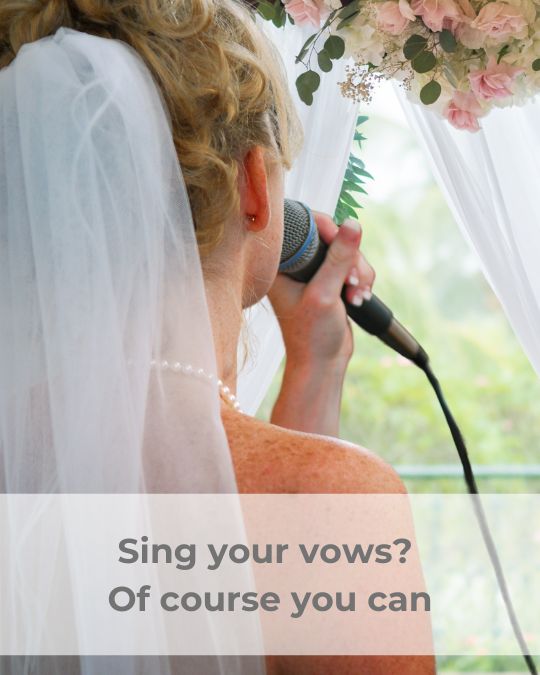Can I sing my vows?
Categories: | Vows |
 Pared
down weddings mean that couples are more relaxed
about being in the limelight. It also means that
they are looking at unique and unusual ways to put
their on stamp on the ceremony, particularly on the
vows, as the central focus of the ceremony in the
absence of large numbers of guests and other
factors. So I wasn't surprised when I was asked
whether a couple could sing their vows. But ask a
dozen celebrants that question and you are likely to
get a dozen different variations on either Yes or
No.
Pared
down weddings mean that couples are more relaxed
about being in the limelight. It also means that
they are looking at unique and unusual ways to put
their on stamp on the ceremony, particularly on the
vows, as the central focus of the ceremony in the
absence of large numbers of guests and other
factors. So I wasn't surprised when I was asked
whether a couple could sing their vows. But ask a
dozen celebrants that question and you are likely to
get a dozen different variations on either Yes or
No.Here is my take on this Wilder Thought question:
Short answer. There is nothing to stop you vocalising your vows in any way you choose, as long as they are audible!
Vows consist of two
totally separate and different parts
I ask everyone here (or I call upon the persons here present) to witness that I [Full Name] take you [Full Name] to be my lawful wedded [insert your chosen term from one of the approved terms]
Anything else you add are personal promises. You don't have to make promises, but if you choose to do so nothing in those promises should put conditions on the marriage.
What does the Marriage Act
say?
Where a marriage is solemnised by or in the presence of an authorised celebrant, not being a minister of religion, it is sufficient if each of the parties says to the other, in the presence of the authorised celebrant and the witnesses, the words [the legal statement written in my previous paragraph above]You will note the use of the word says.
What does says
mean?
To utter, speak; to express in words, declare; to make known, tellPut that in the context of the Marriage Act, and what we are being told is that, for a marriage to be legal, the mandated words must be uttered/vocalised by each of you in the presence, and hearing, of your celebrant and your witnesses. It says nothing about how loud, how soft, how fast, how slow, how high, how low, etc
So can you sing your legal
vows?
The legal vows work in 3/4 time (waltz). You can sing a capella or have a soft music accompaniment
A very good reason to sing
your vows
- when we sing we move our lips, tongue, and vocal chords differently from the way we do when we talk
- the language and communication centres of our
brains function differently when we are singing
compared to when we are talking. When you sing,
you are no longer using the left side of your
brain.
Add to that, when we sing we are much more conscious of regulating our breathing, which helps too.
So, if you are inclined to stutter when nervous,
overwhelmed, or searching for words, sing your
vows, or at the very least, read them.
Reading your vows works too, because the words are
there in front of you.
What about your personal
promises?
- Speak your personal promises
- Sing your personal promises
- Whisper them into one another's ear
- Hand them to one another without sharing them with anyone
- Convey them by means of charades
- Show them to one another on flash cards
- Express them in interpretative dance
- And any other wild thought you can think of.
And you don't have to do any one of the above
individually, one after the other, as you must for
the legal vows. So, if you wish to express your
vows in unison, in a duet, or as a conversation or
question and answer session, go for it.
I'll be delighted!
